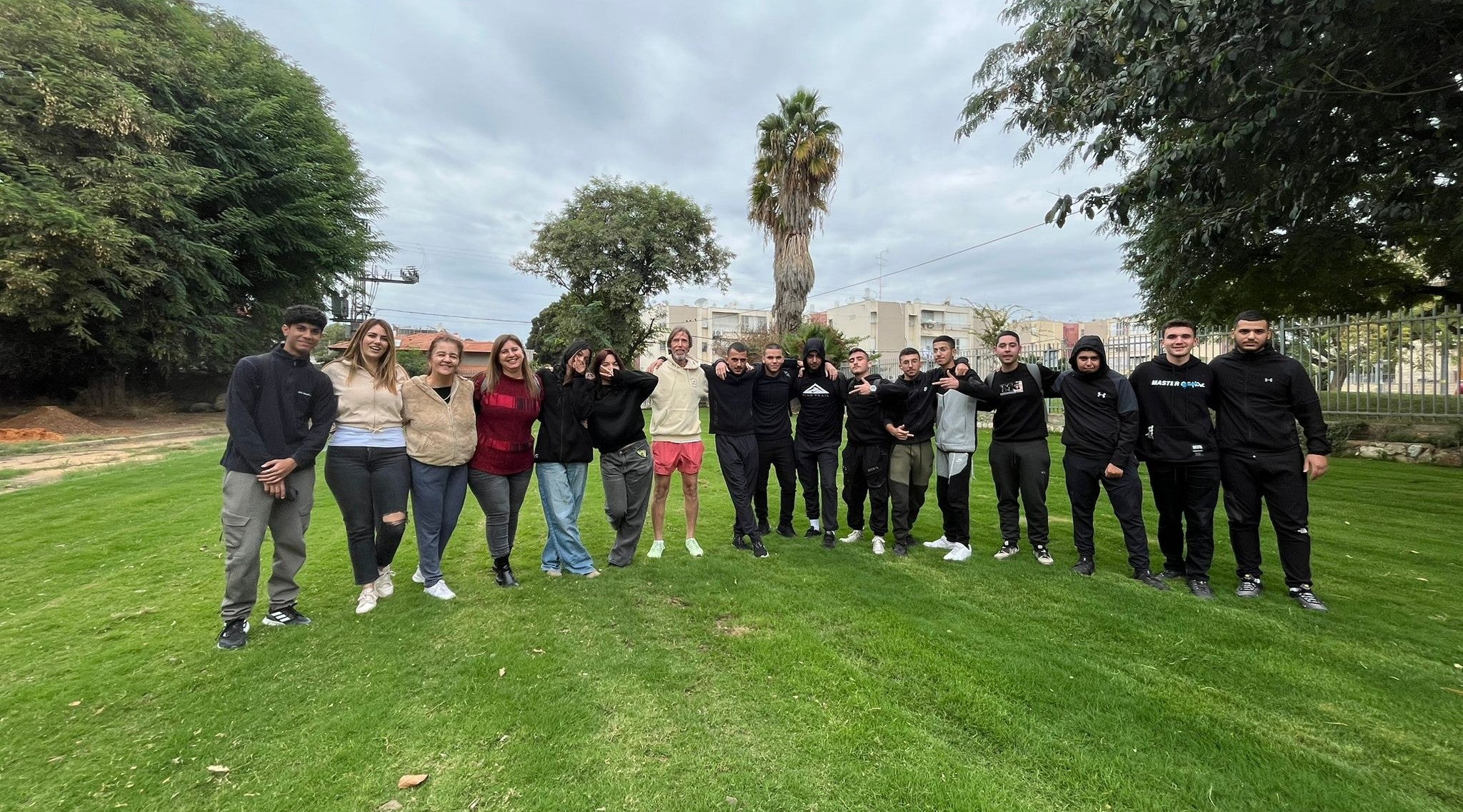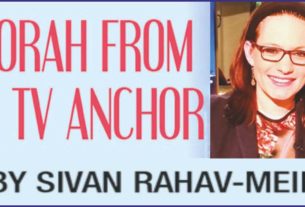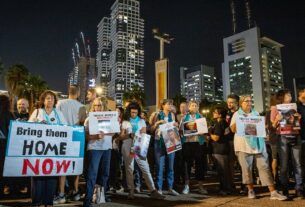RAMLE, Israel — In the heart of the central Israeli city of Ramle, where Jews and Arabs live side by side, the Yigal Alon Multidisciplinary High School is trying to spearhead a quiet revolution.
The student body reflects the full tapestry of Israeli society, with students who are Jewish, Muslim, and Christian, religious and secular, native-born and immigrant. The school has a particularly large Ethiopian-Israeli population, and students with special needs. In Israel, such diversity is often treated as a problem to be managed. At Yigal Alon, it is treated as an opportunity, one that was especially important during Israel’s two-year war.
When 32-year-old alumnus Moshael Shlomo, a commander in the IDF’s Yamam counterterrorism unit, was killed on October 7, 2023, his death reverberated through the school community. Shlomo, who grew up in a socioeconomically disadvantaged home in Ramle, attended Yigal Alon from 2006 to 2009, and was known for his charisma, athleticism and drive to help others. He served as a paratrooper, then rose to become an IDF team commander and demolitions expert in Yamam.
After Shlomo’s death in combat with Hamas attackers near Kibbutz Be’eri, Yigal Alon students worked with school staff and Shlomo’s family to begin transforming a neglected plot on the school campus into a lawn — the first stage of a memorial project that eventually will include a sports field, outdoor seating and garden of peace. The project seeks to honor Shlomo’s memory by creating a space that reflects his passion for athletics and community, and the area will serve as an after-school haven for teenagers who by and large can’t afford the kind of extra-curricular activities their peers do. Administrators hope teens using it will build stronger peer relationships and practice the values Shlomo embodied, including generosity and service to community and country.
“It isn’t just about Shlomo’s athleticism,” said sports teacher Dotan Rotshtein, who is spearheading the project. “It’s about his character of determination and kindness. This project will educate students in his spirit.”
The project at Yigal Alon is one example of the many ways Israelis are memorializing those killed during the war, trying to make something positive out of the pain, hardship and loss they endured during the longest conflict in Israel’s history. Rather than serving as a flashpoint, Shlomo’s death became a unifying experience for Yigal Alon, bringing Arab and Jewish students together in determination to build something positive.
The school, one of 50 in the Amal educational network, offers a rare and tangible model for how to bolster Arab-Jewish coexistence and build a society rooted in shared humanity, administrators said.
“This school is a home not just for students, but for families,” said principal Barak Friedman, himself a school alumnus and Ramle native. “Everyone belongs. Everyone matters.”
In Israel, only eight out of 250 municipalities are considered mixed Jewish-Arab. Almost all public schools are segregated along ethnic and religious lines. Yigal Alon is one of Israel’s very few mixed Arab-Jewish public schools.
“Once people saw this as a liability,” Friedman said. “I see it as a wonderful opportunity.”
“At a time of growing extremism in Israeli society, the connections between these youths is quite unique and inspiring,” said Barak Friedman, principal of the Yigal Alon school in Ramle, Israel. (Courtesy of Amal)
Staff at the school try to weave the values of shared humanity into academic life. During the war, students met weekly in conversation circles where Jewish and Arab classmates spoke openly about how the conflict was affecting their families. They worked together on projects like murals and performances to express their emotions.
Older students tutor younger ones, often across language and cultural lines, and 11th graders complete community service work in both Jewish and Arab institutions. The school also has a large group of Shinshinim — Israeli volunteers from pre-military academies who work alongside teachers to help give students one-on-one attention and assist those with learning disabilities.
Jewish and Arab students and teachers work side by side.
“Students aren’t interested in the ethnic background or origin stories of fellow students; what matters to them is their relationships with each other,” Friedman said. “At a time of growing extremism in Israeli society, the connections between these youths is quite unique and inspiring.”
These connections flourished even during the war.
Within the Amal network — whose diverse portfolio of schools ranges from vocational schools that serve traditionally marginalized Israeli populations including immigrants, Arabs, and haredim to science & technology schools in Israel’s biggest cities — 45 alumni were killed in the war, many of them siblings or cousins of current students. Schools were struck by missiles, relocated due to being in conflict zones or absorbed evacuees. Some students had relatives taken hostage to Gaza, and many had parents or siblings in combat. Everyone was affected.
“The loss is not only in the fallen,” said Asher Ben Shoshan, Amal’s head of human resources. “Many of our students and staff were living with traumas.”
Amal’s schools responded by expanding trauma-related programming, offering counseling, and creating spaces for students to process emotions through dialogue and creativity.
“We’re not just teaching algebra or English,” Ben Shoshan said. “We’re helping young people hold their lives together. That is the mission now.”
Traditionally a network of vocational schools, Amal has focused in recent years on turning its schools into centers of science and technology while also trying to heal Israel’s societal rifts and strengthen democratic values among its more than 3,000 teachers and 26,000 students.
“We believe that education is not just about knowledge but about citizenship,” said Tamar Peled Amir, Amal’s deputy director general for education, technology and R&D. “Our classrooms are where the future of Israel is being written — not just with math equations or essays, but with empathy, resilience and an unwavering commitment to building a shared society.”
.jpg)
The killing of Yigal Alon alumnus Moshael Shlomo on Oct. 7, 2023, galvanized the school community to come together and build something to honor the memory of the slain IDF commander. (Courtesy of Amal)
Karen Tal, Amal’s director general, said focusing on Israeli society is part of the schools’ educational responsibility.
“We don’t have the luxury of detachment,” Tal said. “Our responsibility is not only academic. It is human. Shared society is not a slogan. It is the essence of democracy. When students learn to listen to one another, to respect differences and to see the humanity in the other, they are learning what it means to live in a democratic society. That is the Israel we are working to build, one classroom at a time.”
Arab students in Rotshtein’s after-school fitness club now wear team shirts bearing Shlomo’s name. “They want to feel part of this country, part of his legacy,” Rotshtein said.
“The space we decided to build in Moshael’s honor reflects who he was: generous, kind, committed to others,” Rotshtein said. “It is also a project that brings people together, Jews and Arabs, in a spirit of unity.”
Friedman, the principal, said, “Whether you are Jewish or Arab, religious or secular, we teach our students to take responsibility for themselves, for each other and for society. Because only that kind of responsibility will allow Israel to heal.”
It’s an ethos Friedman himself embodies: As part of his military reserve duty, he’s a “notifier” —part of the three-person crew that visits parents’ homes when a soldier is killed to inform them of the terrible news. The experience has shaped his worldview, and the school’s focus on service to community.
Much of the implementation for school-specific initiatives like the Shlomo memorial project relies on community partnerships and philanthropy.
“We are reaching out to the global Jewish community and to friends of Israeli democracy everywhere,” said Yael Nathanel, Amal’s resource development director. “Projects like this do not just build walls and gardens. They build empathy, resilience and vision. But we need help to ensure that this becomes a reality.”
Power the news that matters to you. Before 2025 ends, help (JEWISH REVIEW)’s independent, award-winning newsroom document Jewish history in real-time.
Keep Jewish Stories in Focus.
(JEWISH REVIEW) has documented Jewish history in real-time for over a century. Keep our journalism strong by joining us in supporting independent, award-winning reporting.




